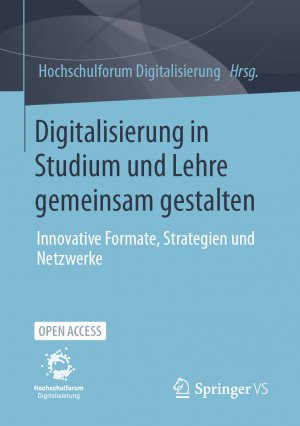“Shaping digitization in studying and teaching together” – The first scientific anthology of the HFD
“Shaping digitization in teaching and learning together. Innovative Formats, Strategies and Networks” is the first scientific anthology of the Hochschulforum Digitalisierung (HFD). With the open access publication, the HFD wants to promote more collaboration, openness, opportunities for participation, and the courage to explore new, unusual paths. Here you can download the anthology, learn more about its development process, get a first impression in our blog series or find individual chapters within the five topics.

The creation process – a collaborative effort
Shaping digitization in teaching and learning together – this has been the aim of the Hochschulforum Digitalisierung since it was founded in 2014. The focus is on a constantly growing community that is differentiated across institutional boundaries. It is precisely in its willingness to support the activities of the HFD that it demonstrates on a daily basis how productively collaboration can function in this field of action. The anthology reveals the multitude of necessary questions, creative approaches to solutions, and strategic design options for digitization in teaching and learning that characterize the diverse work of the HFD at its core. The programmatic framing of this publication is based on four central theses:
(1) Collaboration is the key to success,
(2) It needs openness as an attitude and strategy,
(3) Participation and empowerment bring about educational success,
(4) Innovation requires the courage to take new, unusual paths.
The anthology “Shaping Digitization in Teaching and Learning Together. Innovative Formats, Strategies and Networks” shows the enormous potential of collaborative work processes and the willingness of the HFD community to perform: Almost 90 contribution proposals were submitted within two months, half of which were elaborated by May 2020. In addition, 65 scientists agreed to serve as reviewers for the anthology. For this unique commitment, the Hochschulforum Digitalisierung would like to thank all those who – individually and collectively – developed, reviewed and revised proposals and contributions.
The anthology takes a holistic perspective and addresses a wide range of topics: from more general lines of development and trends to collaborative approaches (at local, national, and international levels), higher education strategies and participation opportunities, and innovative didactic formats and teaching-learning settings for imparting knowledge and (future) competencies.
Together, the 33 contributions give a comprehensive impression of the challenges and opportunities of digital transformation in higher education. In doing so, they not only record the status quo, but also point out many possible steps for shaping digitization in studying and teaching.

The five thematic sections of the anthology:
- Higher education and digitization:The first part reflects broader development lines and trends. It becomes clear that the design of digitization is first and foremost a socio-cultural issue that is being negotiated in universities as well as in the higher education didactic and policy community.
- Collaborations and networks:Part Two reflects on three policy levels that govern collaborations and work in networks.
- Governance and change management:The third part is devoted to broader governance and change management issues. No less than three contributions deal with the central topic of developing university strategies.
- Competencies and Curricula for the Digital Age:Part four of this anthology addresses key competencies and the teaching of (digital) competencies in the digital age. The first two papers provide insights into the importance and teaching of Future Skills in higher education.
- Didactics:The fifth part of the HFD anthology deals with the possibilities of making university teaching in the digital age interesting, interactive and focused on learning success. The contributions collected in this section testify not least to the innovative spirit and commitment of teachers and staff in didactics or support facilities, who shape teaching under the changed conditions of digitization almost daily, directly and in interaction with students.

In the blog series accompanying the anthology “Shaping Digitization Together”, one article from each topic section is presented:
- Lines of development and trends for the 2020s:In his article “Higher Education and Digitization – Lines of Development and Trends for the 2020s,” Markus Deimann exposes myths and narratives that have accompanied the introduction of e-learning and new media in the past and that continue to shape the discourse today. Deimann’s critical review concludes with a “different reading of digitization that is more closely aligned with the needs of higher education teaching.”
- Bologna Digital: In their paper “Bologna Digital – Shaping the Digital Transformation in the European Higher Education Area”, Florian Rampelt, Dominic Orr, Alexander Knoth and Renata Suter elaborate on the importance of digitization for the Bologna Process and the European Higher Education Area (EHEA) that emerged from it. Three central fields of action for shaping the digital transformation in higher education at the European level – mobility and exchange, competence transfer, and quality assurance – will be examined with a view to possible future scenarios.
- Participatory Higher Education Development: Frederic Denker, Ronny Röwert, and Alexa Böckel argue for new forms of student participation in higher education development in their article “Participative Higher Education Development for Digital Transformation – Guidelines for Student-Centered Change Management.” Empirically based on the experiences of the student future working group DigitalChangeMaker, the authors provide a guideline-based phase model of student participation and translate it into recommendations for action for students and university officials.
- Data Literacy Education:In her paper “Data Literacy Education for Students of All Subjects. Competence goals, curricular integration and didactic design of interdisciplinary teaching-learning offers”, Matthias Bandtel, Leonie Kauz and Natalia Weißker want to give impulses and recommendations for action on data literacy education for students of all subjects. The authors discuss approaches to the definition of learning objectives, possibilities of curricular integration and a suitable didactic design of teaching-learning settings. Finally, the Mannheim Model Data Literacy Education (modal) is presented as an example of a possible implementation strategy.
- Remote labs: The Digital Future of Learning and Teaching with Remote Labs, Tobias R. Ortelt, Claudius Terkowsky, Andrea Schwandt, Marco Winzker, Anke Pfeiffer, Dieter Uckelmann, Anja Hawlitschek, Sebastian Zug, Karsten Henke, Johannes Nau, and Dominik May use five case studies to show how remote labs can be integrated into studying and teaching. This blog post focuses primarily on the authors’ recommendations for implementing a remote lab infrastructure and concludes with their critical look at the current lab landscape at German universities and the resulting development prospects.

Introduction
Shaping Digitization in Teaching and Learning Together: Perspectives from the Hochschulforum Digitalisierung by Oliver Janoschka, Florian Rampelt, Julius-David Friedrich, Martin Rademacher
Focus and topics of the anthology by Christoph König, Katharina Mahrt
Higher education and digitization
Higher Education and Digitization – Lines of Development and Trends for the 2020s by Markus Deimann
Knowledge and its Society by Michael Jäckel
Subject differences in digital higher education – an analysis based on publication data by Philipp Gross, Alexandra Shajek, Annette Stelter, Katia Tödt, Nicolas Winterhager.
Digital Ethics of Education: Methodological Development of a Framework by Claudia Lemke, Dagmar Monett, Gert Faustmann, Kathrin Kirchner.
Cooperations and networks
State university networks in digital higher education. Goals, guiding ideas, synergy potentials by Tina Ladwig, Christiane Arndt
Collaborations on digitization in teaching, research and administration at universities. Secondary analysis of a nationwide survey by Harald Gilch, Astrid Book, Klaus Wannemacher
Bologna Digital – Shaping the Digital Transformation in the European Higher Education Area by Florian Rampelt, Dominic Orr, Alexander Knoth, Renata Suter
Governance and change management
The digital transformation as a driver of university development – strategy patterns for the digitization of university teaching by Jannica Budde
Between dynamics and synchronization. Challenges and options for action for the strategic university-wide digital transformation of university teaching. by Marcel Graf-Schlattmann, Birte Thomsen, Melanie Wilde, Dorothee M. Meister, Gudrun Oevel
The digitization of teaching and higher education policy. What should not be overlooked in strategy formation by Joachim Metzner
Learning Analytics from an Institutional Perspective: A Guidance Framework for Higher Education Data Use by Falk Scheidig, Monika Holmeier.
Participatory University Development for Digital Transformation – Guidelines of Student-Centered Change Management by Frederic Denker, Ronny Röwert, Alexa Böckel.
Analysis of didactic changes due to digitalization. The fairy tale of more participation? by Christina Gloerfeld
Inclusion and Digitization: Legal Requirements and Potentials for Universities by Isabel Zorn
Onlife Learning Spaces. Action perspectives of hybrid learning environments at universities by Katja Ninnemann
Physical space in the context of digitization. Perspectives for teaching and learning space constellations at universities by Richard Stang, Anke Petschenka, Christine Gläser, Alexandra Becker
Helping to Develop a Strategy for Digital Credentials in Education by Matthias Gottlieb, Hans Pongratz.
Tamper-proof Digital Credentials Verifiable at the Push of a Button: The Blockchain as Initiator of International Cooperation Projects by Anastasia Bertini, Annelie Pentenrieder, Jan Rebentisch, Samer Schaat, Robert Rentzsch.
Competencies and curricula for the digital age
Future Skills for Tomorrow’s World: The Future Skills Triple Helix Model of Agency in Emergent Practice Contexts by Ulf-Daniel Ehlers.
Employability and skills for the future of work using the example of mechanical engineeringbyMarija Stambolieva.
Data Literacy Education for students of all subjects. Competence goals, curricular integration and didactic design of interdisciplinary teaching-learning offers by Matthias Bandtel, Leonie Kauz, Natalia Weißker
Curriculum Development in the Age of Digitization: Frameworks, Challenges, Formats, and Content by Tobias Seidl, Antje Michel
Media Education in the First Phase of Teacher Education and the Significance of the Media Habitus of Student Teach ers by Sue-Ann Bäsler.
Heterogeneous digital literacy self-assessments among student teachers by Charlott Rubach, Rebecca Lazarides.
Mobile learning, self-direction, and gamification. Results of a qualitative accompanying study on the opportunities and limitations of an inverted classroom event in teacher:in-service professionalization. by Swantje Borukhovich-Weis, Inga Gryl, Ewa Łączkowska, Björn Bulizek
Didactics
Gaming the System: New Perspectives on Learning by Thomas Bröker, Thomas Voit, Benjamin Zinger
Gamification as a Didactic Tool in Higher Education by Daniel Tolks, Michael Sailer
Online-Planspiele als Wegbereiter für internationale und digitale Hochschullehre by Sven Ivens, Konstantin Kaiser
The Digital Future of Learning and Teaching with Remote Laboratories by Tobias R. Ortelt, Claudius Terkowsky, Andrea Schwandt, Marco Winzker, Anke Pfeiffer, Dieter Uckelmann et al.
Agile learning digitally supported: The eduScrum Method in University Teaching by Nico Sturm, Heike Rundnagel
“Method: sticky notes”?! Design thinking and the digital transformation of higher education. A contribution to addressing the dual technology deficit in higher education didactics. by Hans Jörg Schmidt
Future-proof formats for digital learning offers – innovative didactic approaches using the example of a learning platform for artificial intelligence by Dana-Kristin Mah, Julia Hense
How can digital education contribute to anchoring education for sustainable development in university teaching? by Florian Kohler, Alexander Siegmund
Contact
 Christoph König
Christoph König
I am text block. Click edit button to change this text. Lorem ipsum dolor sit amet, consectetur adipiscing elit. Ut elit tellus, luctus nec ullamcorper mattis, pulvinar dapibus leo.


